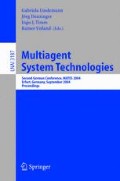Abstract
Classical logic predicts that everything (thus nothing useful at all) follows from inconsistency. A paraconsistent logic is a logic where inconsistency does not lead to such an explosion.
We argue that paraconsistent logics are especially advantageous in order to deal with assertions made by intelligent agents. Other propositional attitudes like knowledge and beliefs can in principle be treated along the same lines. We propose a many-valued paraconsistent logic based on a simple notion of indeterminacy. The proposed paraconsistent logic has a semantics that extends the one of classical logic and it is described using key equalities for the logical operators. A case study is included.
We briefly compare with logics based on bilattices. We finally investigate how to translate the paraconsistent logic into classical predicate logic thereby allowing us to make use of automated deduction of classical logic in the future. We base our initial translation on recent work by Muskens. Our final translation is polynomial in the size of the translated formula and follows the semantics for the paraconsistent logic directly.
This research was partly sponsored by the IT University of Copenhagen.
Access this chapter
Tax calculation will be finalised at checkout
Purchases are for personal use only
Preview
Unable to display preview. Download preview PDF.
References
Abe, J.M.: Some recent applications of paraconsistent systems to AI. Logique & Analyse 157, 3–96 (1997)
Anderson, A.R., Belnap Jr., N.D.: Entailment: The Logic of Relevance and Necessity. Princeton University Press, Princeton (1975)
Arieli, O., Avron, A.: Bilattices and paraconsistency. In: Batens, D., Mortensen, C., Priest, G., Van-Bengedem, J. (eds.) Frontiers in Paraconsistent Logic, pp. 11–27. Research Studies Press, Hertfordshire (2000)
Arieli, O., Denecker, M.: Reducing preferential paraconsistent reasoning to classical entailment. Journal of Logic and Computation 13(4), 557–580 (2003)
Bagai, R.: A query construct for paraconsistent databases. In: Proceedings of the 7th International Conference on Information Processing and Management of Uncertainty in Knowledge-Based Systems, Paris, France, pp. 428–434 (1998)
Bagai, R., Sunderraman, R.: A paraconsistent relational data model. International Journal of Computer Mathematics 55(1), 39–55 (1995)
Belnap Jr., N.D.: A useful four-valued logic. In: Dunn, J.M., Epstein, G. (eds.) Modern Uses of Multiple-Valued Logi, pp. 8–37. D. Reidel (1977)
Besnard, P., Hunter, A.: Introduction to actual and potential contradictions. In: Gabbay, D.M., Smets, P. (eds.) Handbook of Defeasible Reasoning and Uncertainty Management Systems, vol. II, pp. 1–9. Kluwer Academic Publishers, Dordrecht (1998)
Bratman, M.E.: Intentions, Plans, and Practical Reason. Harvard University Press, Cambridge (1987)
Carnielli, W.A., Coniglio, M.E., D’Ottaviano, I.M.L. (eds.): Paraconsistency: The logical way to the inconsistent. Marcel Dekker, New York (2002)
Carnielli, W.A., Marcos, J., de Amo, S.: Formal inconsistency and evolutionary databases. Logic and Logical Philosophy 8, 115–152 (2000)
Church, A.: Introduction to Mathematical Logic. Princeton University Press, Princeton (1956)
da Costa, N.C.A., Subrahmanian, V.S.: Paraconsistent logics as a formalism for reasoning about inconsistent knowledge bases. Artificial Intelligence in Medicine 1, 167–174 (1989)
Dix, J., Leite, J.A., Satoh, K. (eds.): International Workshop on Computational Logic in Multi-Agent Systems. Roskilde University, Computer Science, Technical Reports, vol. 93 (2002)
Evans, G.: Can there be vague objects? Analysis 38(4), 208 (1978)
Gabbay, D., Rodrigues, O., Russo, A.: Revision by translation. In: Bouchon-Meunier, B., Yager, R.R., Zadeh, L.A. (eds.) Information, Uncertainty and Fusion, Kluwer Academic Publishers, Dordrecht (2000)
Genesereth, M.R., Nilsson, N.J.: Logical Foundations of Artificial Intelligence. Morgan Kaufmann Publishers, San Francisco (1987)
Ginsberg, M.: Multivalued logics: A uniform approach to inference in artificial intelligence. Computer Intelligence 4, 265–316 (1988)
Gottwald, S.: A Treatise on Many-Valued Logics. Research Studies Press, Hertfordshire (2001)
Hajek, P.: Metamathematics of Fuzzy Logic. Kluwer Academic Publishers, Dordrecht (1998)
Hintikka, J.: Knowledge and Belief. Cornell University Press (1962)
Hughes, G.E., Cresswell, M.J.: An Introduction to Modal Logic. Methuen and Co., New York (1968)
Muskens, R.: Meaning and Partiality. CSLI Publications, Stanford (1995)
Muskens, R.: On partiality and paraconsistent logics. Notre Dame Journal of Formal Logic 40(3), 352–374 (1999)
Villadsen, J.: Combinators for paraconsistent attitudes. In: de Groote, P., Morrill, G., Retoré, C. (eds.) LACL 2001. LNCS (LNAI), vol. 2099, pp. 261–278. Springer, Heidelberg (2001)
Villadsen, J.: On programs in rational agents. In: Hansen, M.R. (ed.) Nordic Workshop on Programming Theory (2001) (IMM-TR-2001-12)
Villadsen, J.: Paraconsistent query answering systems. In: Andreasen, T., Motro, A., Christiansen, H., Larsen, H.L. (eds.) FQAS 2002. LNCS (LNAI), vol. 2522, pp. 370–384. Springer, Heidelberg (2002)
Villadsen, J.: A paraconsistent higher order logic. In: International Conference on Artificial Intelligence and Symbolic Computation, Springer, Heidelberg (2004) (to appear in LNCS)
Wooldridge, M.: An Introduction to Multiagent Systems. John Wiley & Sons, Chichester (2002)
Zadeh, L.A.: Fuzzy sets. Information and Control 8, 338–353 (1965)
Author information
Authors and Affiliations
Editor information
Editors and Affiliations
Rights and permissions
Copyright information
© 2004 Springer-Verlag Berlin Heidelberg
About this paper
Cite this paper
Villadsen, J. (2004). Paraconsistent Assertions. In: Lindemann, G., Denzinger, J., Timm, I.J., Unland, R. (eds) Multiagent System Technologies. MATES 2004. Lecture Notes in Computer Science(), vol 3187. Springer, Berlin, Heidelberg. https://doi.org/10.1007/978-3-540-30082-3_8
Download citation
DOI: https://doi.org/10.1007/978-3-540-30082-3_8
Publisher Name: Springer, Berlin, Heidelberg
Print ISBN: 978-3-540-23222-3
Online ISBN: 978-3-540-30082-3
eBook Packages: Springer Book Archive

